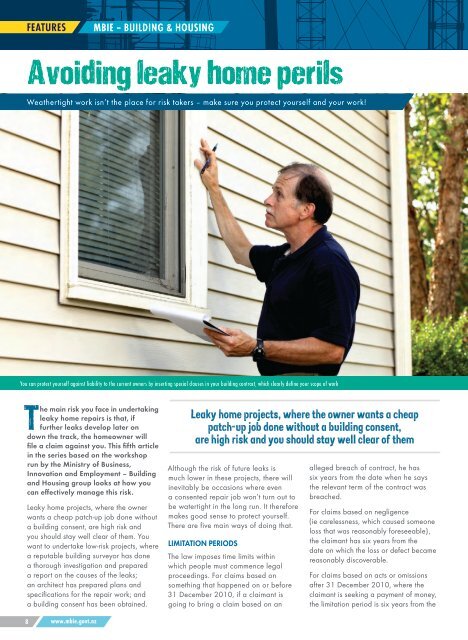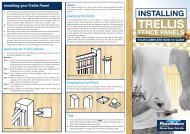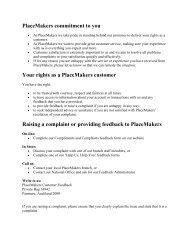FEATURESMBIE – BUILDING & HOUSINGAvoiding leaky home perilsWea<strong>the</strong>rtight work isn’t <strong>the</strong> place for <strong>risk</strong> takers – make sure you protect yourself and your work!You can protect yourself against liability to <strong>the</strong> current owners by inserting special clauses in your building contract, which clearly define your scope of workThe main <strong>risk</strong> you face in under<strong>taking</strong>leaky home repairs is that, iffur<strong>the</strong>r leaks develop later ondown <strong>the</strong> track, <strong>the</strong> homeowner willfile a claim against you. This fifth articlein <strong>the</strong> series based on <strong>the</strong> workshoprun by <strong>the</strong> Ministry of Business,Innovation and Employment – Buildingand Housing group looks at how youcan effectively manage this <strong>risk</strong>.Leaky home projects, where <strong>the</strong> ownerwants a cheap patch-up job done with<strong>out</strong>a building consent, are high <strong>risk</strong> andyou should stay <strong>we</strong>ll clear of <strong>the</strong>m. Youwant to undertake low-<strong>risk</strong> projects, wherea reputable building surveyor has donea thorough investigation and prepareda report on <strong>the</strong> causes of <strong>the</strong> leaks;an architect has prepared plans andspecifications for <strong>the</strong> repair work; anda building consent has been obtained.Leaky home projects, where <strong>the</strong> owner wants a cheappatch-up job done with<strong>out</strong> a building consent,are high <strong>risk</strong> and you should stay <strong>we</strong>ll clear of <strong>the</strong>mAlthough <strong>the</strong> <strong>risk</strong> of future leaks ismuch lo<strong>we</strong>r in <strong>the</strong>se projects, <strong>the</strong>re willinevitably be occasions where evena consented repair job won’t turn <strong>out</strong> tobe watertight in <strong>the</strong> long run. It <strong>the</strong>reforemakes good sense to protect yourself.There are five main ways of doing that.LIMITATION PERIODSThe law imposes time limits withinwhich people must commence legalproceedings. For claims based onsomething that happened on or before31 December 2010, if a claimant isgoing to bring a claim based on analleged breach of contract, he hassix years <strong>from</strong> <strong>the</strong> date when he says<strong>the</strong> relevant term of <strong>the</strong> contract wasbreached.For claims based on negligence(ie carelessness, which caused someoneloss that was reasonably foreseeable),<strong>the</strong> claimant has six years <strong>from</strong> <strong>the</strong>date on which <strong>the</strong> loss or defect becamereasonably discoverable.For claims based on acts or omissionsafter 31 December 2010, where <strong>the</strong>claimant is seeking a payment of money,<strong>the</strong> limitation period is six years <strong>from</strong> <strong>the</strong>8www.mbie.govt.nz
elevant act or omission. But even after<strong>the</strong> six years have expired, if <strong>the</strong> claimantdiscovers (or should have discovered)that he has a claim, he has a fur<strong>the</strong>rthree years <strong>from</strong> <strong>the</strong>n to file his claim.Ho<strong>we</strong>ver, where <strong>the</strong> claim relates tobuilding work, no claim can be broughtmore than ten years after <strong>the</strong> act oromission upon which <strong>the</strong> claim is based.BUILDING CONTRACTYou can protect yourself againstliability to <strong>the</strong> current owners byinserting special clauses in your buildingcontract, which clearly define yourscope of work. The special clausesshould provide that you are only hiredto do <strong>the</strong> work shown in <strong>the</strong> plans andspecifications, not to comment on <strong>the</strong>m,nor to point <strong>out</strong> any potential defectsei<strong>the</strong>r in <strong>the</strong> repair work or in <strong>the</strong> rest of <strong>the</strong>house that is not affected by <strong>the</strong> repairs.INSURANCE POLICYHave an insurance policy thatcovers you against <strong>the</strong> <strong>risk</strong> andconsequences of your own mistakes.The first relevant insurance policyis known as a guarantee (or surety)that is offered, for example, by membersof <strong>the</strong> Certified Builders Associationand Registered Master BuildersFederation. These products protect<strong>the</strong> owner ra<strong>the</strong>r than <strong>the</strong> builder andmost do not cover <strong>we</strong>a<strong>the</strong>rtightnesswork; a ‘WaterTight Warranty’ is,ho<strong>we</strong>ver, now available.The second relevant insurance policyis known as Errors & Omissions (E&O)cover or ‘professional indemnity’.WHAT’S THAT ALL ABOUT THEN?Unlike <strong>the</strong> surety products, this protects<strong>the</strong> builder ra<strong>the</strong>r than <strong>the</strong> owner. Itcovers you where you or your employees,contractors, subcontractors or suppliershave made a mistake, or put faultycomponents or materials into <strong>the</strong> building.LIMITED LIABILITY COMPANIESThe fourth way of protecting yourselfis by way of limited liability companiesand trusts. The whole idea of a limitedliability company is to protect yourpersonal assets <strong>from</strong> business <strong>risk</strong>s.Ho<strong>we</strong>ver, you cannot abuse <strong>the</strong> privilegeof limited liability; you cannot, forexample, keep liquidating your companyand replacing it with a new one foreach leaky home job you undertake.Secondly, a limited liability companyoffers no protection against claimsbrought against you personally, ifyou had ‘hands-on’ involvement in<strong>the</strong> remediation work (ie.: you workedon-site or issued instructions ab<strong>out</strong>how to do <strong>the</strong> remedial work).AND TRUSTSThe necessary safeguard in such asituation (which is typical in smallowner-operator businesses) can beprovided by a trust. When you put anasset (such as your house) into trustand you become a trustee, you holdthat particular asset as a custodian orguardian for <strong>the</strong> people who really ownit, namely <strong>the</strong> beneficiaries. For thatreason, your own creditors can’t touchthat asset, unless <strong>the</strong>y can prove yourtrust is a sham, or you put your assetsinto trust for <strong>the</strong> purpose of defeatingTEST YOUR KNOWLEDGE!your creditors. So your trust has tobe genuine and it obviously pays tocreate your trust when everything isrosy, ra<strong>the</strong>r than when <strong>the</strong> creditorsare breathing down your neck.YOUR WORKThe fifth and possibly <strong>the</strong> cheapestand most effective way to avoid futureliability for leaks, is to be thoroughin your work ra<strong>the</strong>r than economical.These are <strong>the</strong> types of projectswhere overkill is more appropriatethan economising. Hopefully, youwill be able to factor that degree ofthoroughness into your pricing.NOTE: This article is not intended to berelied upon as legal advice. Please notethat <strong>the</strong> views and opinions expressed inthis article are those of Madison Hardyand do not necessarily reflect <strong>the</strong> opinionor position of <strong>the</strong> Ministry of Business,Innovation and Employment – Buildingand Housing group.Next monthThe next article will discusshealth and safety in <strong>the</strong> contextof remediation projects.This article was provided byGeoff Hardy and Gagan Tangriof Madison Hardy, a commerciallaw firm specialising in constructionlaw. It is not intended as legaladvice. For fur<strong>the</strong>r informationplease phone (09) 970 9569 ore-mail info@madisonhardy.com.4) a b c5) a b c6) a b cWhat special clause should you includein your building contract?a) That you are only hired to do <strong>the</strong> workshown in <strong>the</strong> plans.b) That you are responsible for pointing<strong>out</strong> potential defects.c) That Target presenters are not allo<strong>we</strong>dwithin 100km of you.What is <strong>the</strong> idea behind a limited liabilitycompany?a) A very cunning one.b) It allows you tax exemptions.c) It helps protect your personal assets<strong>from</strong> business <strong>risk</strong>s.When is <strong>the</strong> best time to establisha trust?a) When business is rosy.b) When creditors are breathing downyour neck.c) When you take a trophy wife.NB: The questions and ans<strong>we</strong>rs in this section have been produced by <strong>the</strong> publisher and do not necessarily reflect views or opinions of <strong>the</strong> contributing organisation.9
















